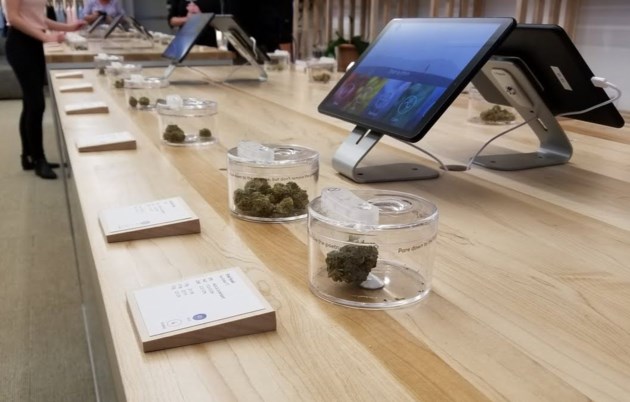Studying Cannabis Availability
"It [cannabis] is associated with negative health outcomes including mental health problems, such as psychosis and addiction, cannabis-related motor vehicle collisions, and poisonings, particularly unintentional ones among children."
Study, published in CMAJ Open
"If it turns out that increased availability of cannabis stores translates into more consumption and more health impacts, this could mean that individuals in poor neighbourhoods are being overexposed to cannabis."
"We may be setting up these individuals to consume more and have more harms."
Dr.Daniel Myran, Ottawa Hospital, study lead author
"Canada is conducting a huge, unprecedented experiment in legalizing recreational cannabis, and it's crucial to gather as much data as we can."
"We need to understand not only where and how cannabis is being sold, but also what the impacts are on health and society."
Dr.Peter Tanuseputro, physician, scientist, The Ottawa Hospital, study senior author
| In total, the study compared 260 cannabis stores that opened in Canada in the first six months of legalization. (David Horemans/CBC) |
"Curriculum focused on the ECS [human endocannabinoid system, a network of cannabinoid receptors in cells of the central and peripheral nervous system] is minimal, if any, to none. It isn't taught in medical schools and if it's being implemented now, then it's a recent development."
"We're not tested on it during our exams, and usually the material we are taught throughout our training will reflect the knowledge needed to succeed there. Anything beyond that leaning would have to be self-taught, often during residency, fellowships or just on your own."
Dr.Dan Bal, Stamford Health, Connecticut
 |
| Recreational cannabis became legal in Canada in October 2018. (Juan Mabromata/AFP/Getty Images) |
In the lowest income quintile, these neighbourhoods had the privilege of hosting twice as many pot shops within or nearby (587) as opposed to the country's highest income neighbourhoods which managed to suffice with the presence of only 245 shops gracing their precincts. The researchers assessed neighbourhoods with established pot shops located within one kilometre to determine their proximity to schools, as well. Important to distinguish given that pot use by young people (up to around age 21) can be inimical to the maturing brain.
Family physician at the Ottawa Hospital, and lead author of the study, Dr.Daniel Myran, pointed out that the concentration of pot shops within low-income neighbourhoods raises reasonable concerns about public health issues. Additionally, privately operated pot shops were found to be located closer to schools than their government controlled counterparts, with private shops located a median distance of 577 metres from the closest school, and government shops, a median distance of 744 metres, while both abide by established guidelines in distance from schools.
The Province of Ontario mandates a distance of at least 150 metres distance from schools, while in Quebec that distance is 250 metres. People earning less than $40,000 annually, according to a Statistics Canada study released last year, represent the country's heaviest users of cannabis. Newfoundland and Labrador and Yukon on a per-capita basis hosted the most pot shops, with Ontario and Quebec having the least shops per capita.
 |
| Hobo Recreational Cannabis in Ottawa, April 1, 2019. Jenn Pritchard/ OttawaMatters.com |
Under the federal government's Cannabis Act, legalized in October 2017, provinces and territories are responsible for the regulation of cannabis sales and all provide online retail cannabis sales opportunities while Quebec, New Brunswick, Nova Scotia, P.E.I. and the Northwest Territories operate government-run pot shops; the other provinces and Yukon featuring privately run stores, though British Columbia and Yukon also permit private pot shops and Nunavut offers online sales exclusively.
According to the researchers, the country's mixed options of regulatory regimes highlights it as a living laboratory for the study of the impact of variant sales models. And according to the study published in the CMAJ Open, the use of cannabis is "not benign". They also point out that additional research should look to addressing the issue of whether government or private systems perform better at meeting the goals of cannabis legalization; to wit: eliminating the illicit market, and prevention of youth access to the drug.
"The Ontario College of Pharmacists announced it has made cannabis education mandatory ... and its members have until March 27, 2020, to complete an accredited course to help them provide patients with reliable information on how cannabis interacts with their medications."
"As the availability of recreational cannabis expands, pharmacists will have to consider that any patient may need to be informed on the interaction of cannabis with other medications, much like they do for alcohol use."
Backgrounder, Ontario College of Pharmacists
 |
| People line up outside the Hobo Recreational Cannabis Store on Bank Street April 1, the first day legal pot shops opened in Ottawa. |
Labels: Canada, Cannabis Legalization, Pot Shops, Study

0 Comments:
Post a Comment
<< Home